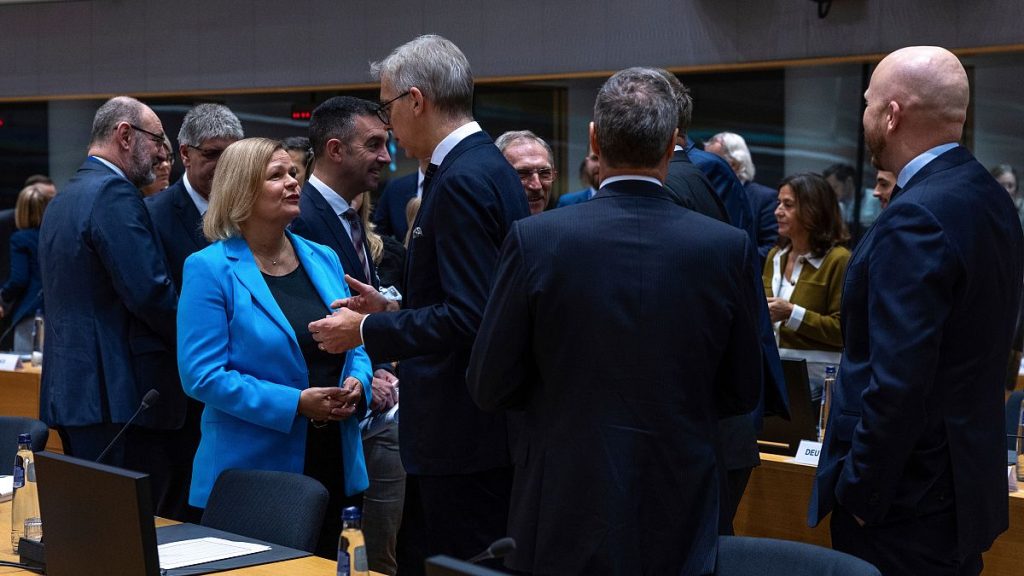The recent political upheaval in Syria, marked by the downfall of President Bashar Al-Assad’s regime, has ignited a complex debate across Europe concerning the future of Syrian refugees who sought sanctuary on the continent during the protracted civil war. This discussion, brought into sharp focus during a meeting of European Home Affairs ministers in Brussels, centers on the possibility of their return to Syria, a prospect fraught with uncertainty and divergent opinions among member states. While some advocate for a cautious approach, emphasizing the need to assess the evolving situation on the ground before initiating any repatriation efforts, others are pushing for a more assertive stance, calling for the expedited return of certain categories of refugees, particularly those deemed to pose a security risk or who are perceived as not integrating successfully into European societies.
The primary point of contention revolves around the timing and conditions under which any potential return could occur. Commissioner Magnus Brunner, responsible for Internal Affairs and Migration, stressed the importance of focusing on voluntary returns, highlighting the necessity of thoroughly evaluating the situation in Syria before determining a clear course of action. This cautious perspective is echoed by representatives from Sweden and Germany, with the latter acknowledging the significant contributions Syrian refugees have made, particularly in sectors like healthcare, and emphasizing that those who abide by the law and actively participate in society are welcome to remain.
However, this measured approach contrasts sharply with the stance adopted by Austria’s Interior Minister, Gerhard Karner, who advocates for a more proactive approach to repatriation. Karner argues against delaying action, urging the commencement of deportation proceedings for individuals deemed “criminals,” those who clash with European values, and those perceived as unwilling to contribute to the workforce. This hardline position underscores the growing division within Europe on how to handle the refugee situation in the aftermath of Assad’s fall. While recognizing the need to address security concerns and integration challenges, other member states emphasize the importance of upholding humanitarian principles and ensuring the safety and well-being of refugees.
The debate concerning the return of Syrian refugees also reflects a broader shift in the political landscape since the peak of the refugee crisis in 2015. Nine years ago, German Chancellor Angela Merkel’s declaration of “Wir schaffen das” (we can do it) signaled a welcoming stance towards refugees fleeing the Syrian conflict. However, this open-door policy has since faced increasing criticism, particularly from conservative factions who advocate for stricter immigration controls and the repatriation of refugees. This shift in sentiment is exemplified by proposals like that of Jens Spahn, a prominent member of Merkel’s own party, who suggests incentivizing returns with financial compensation.
The complexity of the situation is further highlighted by the significant number of Syrians who have integrated into German society, with over 140,000 having obtained German citizenship between 2021 and 2023. This integration, contrasted against the continued presence of a substantial number of Syrians still navigating the asylum process, underscores the multifaceted challenge facing policymakers. Balancing the humanitarian imperative to protect vulnerable individuals with concerns about security, integration, and the potential strain on resources remains a delicate balancing act.
The discussions among European Home Affairs ministers reflect a critical juncture in the ongoing refugee saga. The fall of Assad’s regime has created a new dynamic, prompting renewed consideration of the possibility of returns. However, the absence of a unified approach and the wide range of perspectives on this complex issue underscore the difficulty of finding a solution that addresses the legitimate concerns of all stakeholders while upholding humanitarian principles and international law. The evolving situation in Syria, combined with the differing priorities and political pressures within individual European nations, will continue to shape the debate in the coming months and years, demanding careful consideration and collaborative efforts to navigate the challenges ahead.














